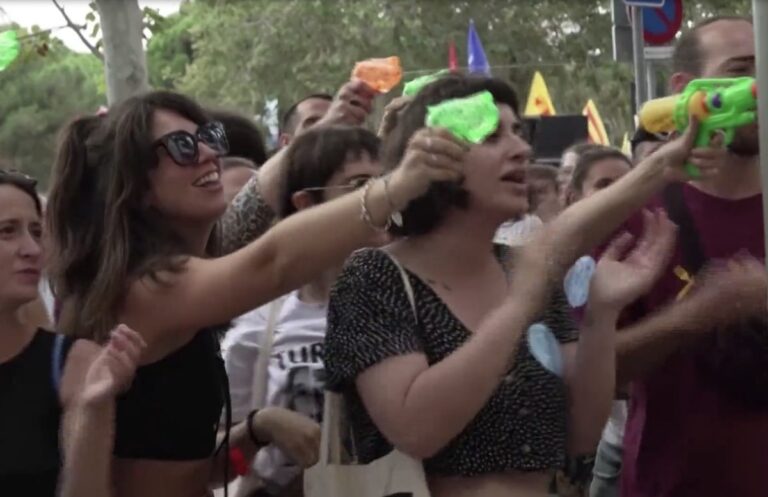Needless to say, tourism can be controversial and a double-edged sword for tourist-populated areas. It can do a lot to support local economies, but over time it can also take over the livelihoods of local people and change their economies. In that sense, some locals in Barcelona have been quite direct in expressing their dissatisfaction with tourists during the city’s most touristy times…
Protesters target tourists in Barcelona
Reader Jessica emailed me to tell me that she is currently on a family vacation in Europe. While in Barcelona last week, her family was sprayed with water from a water gun as they were walking down the street. She didn’t really understand what was going on at the time, but the next day, she saw a huge anti-tourism demonstration on Las Ramblas and it became completely clear to her what was going on.
Indeed, this seems to be happening again and again in Barcelona, where several large protests have taken place in areas popular with tourists, with protesters chanting phrases such as “Tourists go home” and “Barcelona is not for sale” and shooting water guns at tourists, including those sitting in restaurants and cafes.
Angry “anti-tourism” protesters use water pistols to drench foreign tourists in a Barcelona restaurant, after thousands of people marched into the Catalan capital, urging tourists to “go home”. pic.twitter.com/OET7kviseE
— Elijah (@Elijahwasike) July 7, 2024
This is not unique to Barcelona, with similar protests taking place in Mallorca and the Canary Islands, where locals are expressing frustration at the decline in the cost of living and quality of life caused by tourism. In 2023, Barcelona welcomed 26 million overnight guests, spending approximately $13.8 billion.
But these anti-tourism groups say tourists drive up prices, put pressure on public services and increase social inequality as benefits are distributed unfairly. They call for proposals such as closing cruise ship terminals, regulating tourist accommodation and ending public spending on promoting tourism.
Should these types of protests affect our travel choices?
The reader who shared this story with me explained that their family had a wonderful time in Barcelona and would have no hesitation in returning and recommending other travelers to the city. However, they now felt less confident about traveling to a place where locals had such feelings about it and asked for my opinion.
That’s a great question. I’m not sure if there’s an easy answer, but I’d like to give my thoughts on it. There’s no doubt that mass tourism is a big problem in many places. I’m not one of those people who thinks, “How can the locals not be grateful for the money we pay as tourists?” when getting off a cruise ship.
I think the issue is more subtle: even though many of us rely on tourism to support our families, I don’t think we have the right to be welcomed warmly in Hawaii or Venice or anywhere else, or to tell locals how they should feel about us.
With that in mind, here are some thoughts.
Nearly every major source of income for a local economy has its pros and cons. This is not just about tourism, but also cities that are manufacturing or technology centers, etc. I think the sentiment towards tourism in Barcelona is no different than most other big cities that deal with mass tourism. The only difference is whether groups organize and openly protest this. I understand the challenges that tourism poses to many locals, and I think protests like this can start a dialogue between the government and these groups and help ease some of the pain. There are some things the government can do to make tourism more acceptable and beneficial for locals. There is no denying that it is unpleasant to go somewhere as a tourist and get shot with a water gun, but at least these protests are not any more violent.
Personally, I can’t say that this affects my desire to travel anywhere, simply because I’ve realized that in most places that deal with mass tourism, the sentiment is probably the same: some are very much in favor, some are strongly against, and some are somewhere in between.
I consider this much the same as union strikes in the airline or hotel industries – after all, they’re not out to inconvenience customers, but rather it’s the best negotiating technique to get what they want.
Conclusion
While dissatisfaction with mass tourism is a growing issue, some groups in Barcelona are currently expressing their discontent more directly, with protests across the city including pelting tourists with water pistols and protests in popular tourist sites.
Mass tourism is complicated, and while tourism can be good for an area’s economy overall, the money is not always distributed fairly and it can have negative effects on the daily lives of local residents.
What do you think about the anti-tourism protests in Barcelona?

